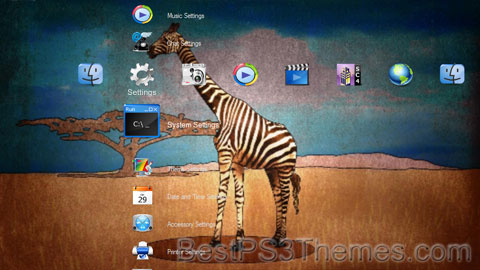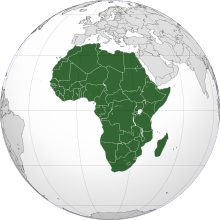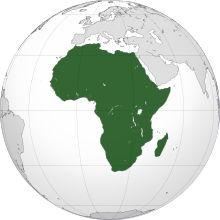Africa theme by ltmreal
Download: Africa.p3t

(1 background)
| Area | 30,370,000 km2 (11,730,000 sq mi) (2nd) |
|---|---|
| Population | 1,393,676,444[1][2] (2021; 2nd) |
| Population density | 46.1/km2 (119.4/sq mi) (2021) |
| GDP (PPP) | $8.05 trillion (2022 est; 4th)[3] |
| GDP (nominal) | $2.96 trillion (2022 est; 5th)[4] |
| GDP per capita | $2,180 (Nominal; 2022 est; 6th)[5] |
| Religions |
|
| Demonym | African |
| Countries | 54 recognized states, 2 partially recognized states, 4 dependent territories |
| Dependencies | External (4) Internal (6+1 disputed)
|
| Languages | 1250–3000 native languages |
| Time zones | UTC-1 to UTC+4 |
| Largest cities | Largest urban areas: |

Africa is the world's second-largest and second-most populous continent after Asia. At about 30.3 million km2 (11.7 million square miles) including adjacent islands, it covers 20% of Earth's land area and 6% of its total surface area.[7] With 1.4 billion people[1][2] as of 2021, it accounts for about 18% of the world's human population. Africa's population is the youngest amongst all the continents;[8][9] the median age in 2012 was 19.7, when the worldwide median age was 30.4.[10] Despite a wide range of natural resources, Africa is the least wealthy continent per capita and second-least wealthy by total wealth, ahead of Oceania. Scholars have attributed this to different factors including geography, climate,[11] corruption,[11] colonialism, the Cold War,[12][13] and neocolonialism. Despite this low concentration of wealth, recent economic expansion and the large and young population make Africa an important economic market in the broader global context. Africa has a large quantity of natural resources and food resources, including diamonds, sugar, salt, gold, iron, cobalt, uranium, copper, bauxite, silver, petroleum, natural gas and cocoa beans, and tropical fruit.
The continent is surrounded by the Mediterranean Sea to the north, the Isthmus of Suez and the Red Sea to the northeast, the Indian Ocean to the southeast and the Atlantic Ocean to the west. The continent includes Madagascar and various archipelagos. It contains 54 fully recognised sovereign states, eight cities and islands that are part of non-African states, and two de facto independent states with limited or no recognition. This count does not include Malta and Sicily, which are geologically part of the African continent. Algeria is Africa's largest country by area, and Nigeria is its largest by population. African nations cooperate through the establishment of the African Union, which is headquartered in Addis Ababa.
Africa straddles the equator and the prime meridian. It is the only continent to stretch from the northern temperate to the southern temperate zones.[14] The majority of the continent and its countries are in the Northern Hemisphere, with a substantial portion and a number of countries in the Southern Hemisphere. Most of the continent lies in the tropics, except for a large part of Western Sahara, Algeria, Libya and Egypt, the northern tip of Mauritania, and the entire territories of Morocco, Ceuta, Melilla, and Tunisia which in turn are located above the tropic of Cancer, in the northern temperate zone. In the other extreme of the continent, southern Namibia, southern Botswana, great parts of South Africa, the entire territories of Lesotho and Eswatini and the southern tips of Mozambique and Madagascar are located below the tropic of Capricorn, in the southern temperate zone.
Africa is highly biodiverse;[15] it is the continent with the largest number of megafauna species, as it was least affected by the extinction of the Pleistocene megafauna. However, Africa also is heavily affected by a wide range of environmental issues, including desertification, deforestation, water scarcity, and pollution. These entrenched environmental concerns are expected to worsen as climate change impacts Africa. The UN Intergovernmental Panel on Climate Change has identified Africa as the continent most vulnerable to climate change.[16][17]
The history of Africa is long, complex, and varied, and has often been under-appreciated by the global historical community.[18] Africa, particularly Eastern Africa, is widely accepted to be the place of origin of humans and the Hominidae clade, also known as the great apes. The earliest hominids and their ancestors have been dated to around 7 million years ago, including Sahelanthropus, Australopithecus africanus, A. afarensis, Homo erectus, H. habilis and H. ergaster, the earliest Homo sapiens (modern human) remains, found in Ethiopia, South Africa, and Morocco, date to circa 233,000, 259,000, and 300,000 years ago, respectively, and Homo sapiens is believed to have originated in Africa around 350,000–260,000 years ago.[a] Africa is also considered by anthropologists to be the most genetically diverse continent as a result of being the longest inhabited.[25][26][27]
Civilisations, such as Ancient Egypt, Kerma, Punt, and the Tichitt Tradition emerged in North, East and West Africa during the 4th and 3rd millennia BC, while the Bantu expansion from 4000 BC until 1000 AD was substantial in laying the foundations for societies and states in Central, East, and Southern Africa. A complex historical patchwork of civilisations, kingdoms, and empires followed, with most African societies recording their state apparatus, literature, and history via oral tradition. Within Africa slavery was historically widespread and internal slave markets were used to fuel various exporting slave trades, creating various diasporas, including in the Americas. From the late 19th century to early 20th century, driven by the Second Industrial Revolution, Africa was rapidly conquered and colonised by European nations, reaching a point when only Ethiopia and Liberia were independent polities.[28] European rule had significant impacts on Africa's societies and the suppression of communal autonomy disrupted traditional local customary practices and caused the irreversible transformation of Africa's socioeconomic systems.[29] Most present states in Africa emerged from a process of decolonisation following World War II, and established the Organisation of African Unity in 1963, the predecessor to the African Union.[30]
Etymology[edit]

Afri was a Latin name used to refer to the inhabitants of what was then known as northern Africa, located west of the Nile river, and in its widest sense referring to all lands south of the Mediterranean, also known as Ancient Libya.[31][32] This name seems to have originally referred to a native Libyan tribe, an ancestor of modern Berbers; see Terence for discussion. The name had usually been connected with the Phoenician word ʿafar meaning "dust",[33] but a 1981 hypothesis[34] has asserted that it stems from the Berber word ifri (plural ifran) meaning "cave", in reference to cave dwellers.[35] The same word[35] may be found in the name of the Banu Ifran from Algeria and Tripolitania, a Berber tribe originally from Yafran (also known as Ifrane) in northwestern Libya,[36] as well as the city of Ifrane in Morocco.
Under Roman rule, Carthage became the capital of the province then named Africa Proconsularis, following its defeat of the Carthaginians in the Third Punic War in 146 BC, which also included the coastal part of modern Libya.[37] The Latin suffix -ica can sometimes be used to denote a land (e.g., in Celtica from Celtae, as used by Julius Caesar). The later Muslim region of Ifriqiya, following its conquest of the Byzantine (Eastern Roman) Empire's Exarchatus Africae, also preserved a form of the name.
According to the Romans, Africa lies to the west of Egypt, while "Asia" was used to refer to Anatolia and lands to the east. A definite line was drawn between the two continents by the geographer Ptolemy (85–165 CE), indicating Alexandria along the Prime Meridian and making the isthmus of Suez and the Red Sea the boundary between Asia and Africa. As Europeans came to understand the real extent of the continent, the idea of "Africa" expanded with their knowledge.
Other etymological hypotheses have been postulated for the ancient name "Africa":
- The 1st-century Jewish historian Flavius Josephus (Ant. 1.15) asserted that it was named for Epher, grandson of Abraham according to Gen. 25:4, whose descendants, he claimed, had invaded Libya.
- Isidore of Seville in his 7th-century Etymologiae XIV.5.2. suggests "Africa" comes from the Latin aprica, meaning "sunny".
- Massey, in 1881, stated that Africa is derived from the Egyptian af-rui-ka, meaning "to turn toward the opening of the Ka." The Ka is the energetic double of every person and the "opening of the Ka" refers to a womb or birthplace. Africa would be, for the Egyptians, "the birthplace."[38]
- Michèle Fruyt in 1976 proposed[39] linking the Latin word with africus "south wind", which would be of Umbrian origin and mean originally "rainy wind".
- Robert R. Stieglitz of Rutgers University in 1984 proposed: "The name Africa, derived from the Latin *Aphir-ic-a, is cognate to Hebrew Ophir ['rich']."[40]
- Ibn Khallikan and some other historians claim that the name of Africa came from a Himyarite king called Afrikin ibn Kais ibn Saifi ("Afrikus son of Abraham") who subdued Ifriqiya.[41][42][43]
- Arabic afrīqā (feminine noun) and ifrīqiyā, now usually pronounced afrīqiyā (feminine) 'Africa', from ‘afara [‘ = ‘ain, not ’alif] 'to be dusty' from ‘afar 'dust, powder' and ‘afir 'dried, dried up by the sun, withered' and ‘affara 'to dry in the sun on hot sand' or 'to sprinkle with dust'.[44]
- Possibly Phoenician faraqa in the sense of 'colony, separation'.[45]
History[edit]
Prehistory[edit]

Africa is considered by most paleoanthropologists to be the oldest inhabited territory on Earth, with the Human species originating from the continent.[46] During the mid-20th century, anthropologists discovered many fossils and evidence of human occupation perhaps as early as seven million years ago (Before present, BP). Fossil remains of several species of early apelike humans thought to have evolved into modern humans, such as Australopithecus afarensis radiometrically dated to approximately 3.9–3.0 million years BP,[47] Paranthropus boisei (c. 2.3–1.4 million years BP)[48] and Homo ergaster (c. 1.9 million–600,000 years BP) have been discovered.[7]
After the evolution of Homo sapiens approximately 350,000 to 260,000 years BP in Africa,[20][21][22][23] the continent was mainly populated by groups of hunter-gatherers.[49][50] These first modern humans left Africa and populated the rest of the globe during the Out of Africa II migration dated to approximately 50,000 years BP, exiting the continent either across Bab-el-Mandeb over the Red Sea,[51][52] the Strait of Gibraltar in Morocco,[53][54] or the Isthmus of Suez in Egypt.[55]
Other migrations of modern humans within the African continent have been dated to that time, with evidence of early human settlement found in Southern Africa, Southeast Africa, Nort
One Reply to “Africa”
Comments are closed.



This theme is exclusive to http://www.bestps3themes.com. I hope you like it. Be sure to check out my other themes. Please don’t forget to rate them….Thanks!!!!!!!!!!!!!